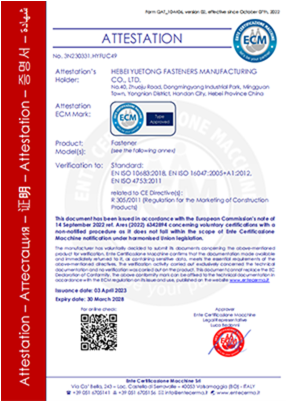авг. . 17, 2024 03:19 Back to list
Understanding Various Types of Specialty Bolt Head Designs and Their Applications
Understanding Specialty Bolt Head Types A Comprehensive Guide
Bolts are essential fasteners used in various applications, providing stability and strength in construction, machinery, and everyday objects. Among the many types of bolts available, those with specialty head types offer unique features that make them suitable for specific tasks. Understanding these variations can help engineers, builders, and DIY enthusiasts select the right fastener for their projects.
1. Hex Bolts
Hex bolts, characterized by their six-sided head, are among the most common types of specialty bolts. They are designed for use with a wrench or socket, providing a strong grip and making them easy to install and remove. Their robust design allows for high torque applications, and they are ideal for securing heavy materials. Hex bolts are often used in structural applications, automotive industries, and heavy machinery.
2. Socket Head Cap Screws
Socket head cap screws are another popular choice, especially in applications requiring high-strength fastening. These bolts have a cylindrical head with a hexagonal recess, allowing for the use of an allen wrench for installation. The design not only provides a clean appearance but also allows for the use of a larger wrench in tighter spaces where traditional wrenches aren't feasible. As a result, socket head cap screws are often found in mechanical assemblies and machinery.
Flanged bolts are designed with a wider, integrated flange that helps distribute the load over a larger area. This unique feature minimizes the risk of damage to the surface being fastened and enhances the bolt's resistance to loosening under vibration. Flanged bolts are commonly used in automotive applications, where the risk of vibration is higher, making them a reliable choice for critical assemblies.
specialty bolt head types

4. Carriage Bolts
Carriage bolts have a rounded head with a square neck, which prevents the bolt from turning when the nut is tightened. This design feature makes them ideal for applications where only one side of the fastening is accessible. Carriage bolts are frequently used in wood and metal connections, such as in furniture assembly, construction, and outdoor projects. Their ability to be flush with the surface provides a clean finish, which is essential in visible applications.
5. Torx Bolts
Torx bolts feature a star-shaped recess that allows for increased torque transfer and reduces the risk of cam-out compared to traditional hex bolts. This specialty head is particularly useful in electronic devices and automotive applications, where precision and torque management are essential. The distinctive design of torx bolts allows for a tighter fit, enhancing the integrity of the assembly and reducing wear over time.
6. Specialty Head Bolts
Beyond the common types outlined, specialty head bolts can also include designs such as round head, flat head, and oval head bolts, tailored for specific needs. For instance, flat head bolts can be countersunk for a flush finish, while round head bolts are used when a smooth surface finish is required.
Conclusion
Choosing the right specialty bolt head type is crucial for the success of any project. Each type serves a specific purpose, balancing aesthetics, functionality, and strength. By understanding the characteristics and applications of various specialty bolts, professionals and hobbyists alike can make informed decisions that enhance the durability and reliability of their assemblies. Whether for construction, automotive, or cosmetic purposes, the right bolt type can significantly impact overall project success.
-
The Ubiquitous Reach of DIN934 in Application Realms
NewsMay.16,2025
-
Exploring Different Bolt Types
NewsMay.16,2025
-
Cracking the Code of Sleeve Anchor Mastery
NewsMay.16,2025
-
Clamp Design Principles,Types and Innovations
NewsMay.16,2025
-
Artistry Inspired by the Humble Anchor Bolt
NewsMay.16,2025
-
A Deep Dive into Screw Types
NewsMay.16,2025


